Gerald Massey
Churchward, Albert
Albert Churchward (1852-1925) was a younger brother of James Churchward, the ‘inventor’ of Mu. Although trained as a medical practitioner,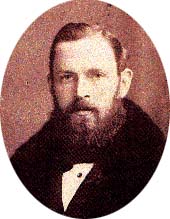 his real passion was the study of the early development of religion[943] and the later development of Christianity from Egyptian origins. In that respect he was greatly influenced by the work of Gerald Massey(a)(c). He makes no reference to Mu or Atlantis, because he either disagreed with his brother’s views or just did not wish to tread on his literary toes! His book The Origin and Evolution of the Human Race[903] can now be read online(b).
his real passion was the study of the early development of religion[943] and the later development of Christianity from Egyptian origins. In that respect he was greatly influenced by the work of Gerald Massey(a)(c). He makes no reference to Mu or Atlantis, because he either disagreed with his brother’s views or just did not wish to tread on his literary toes! His book The Origin and Evolution of the Human Race[903] can now be read online(b).
(a) https://www.peuplesawa.com/fr/bnlogik.php?bnid=759&bnk=&bnrub=&vip=581
(b) https://www.cedarcitylodge.org/books/origin_and_evolution.pdf
(c) See: https://web.archive.org/web/20180316022505/https://gerald-massey.org.uk/massey/cmc_churchward.htm
Taylor, Thomas
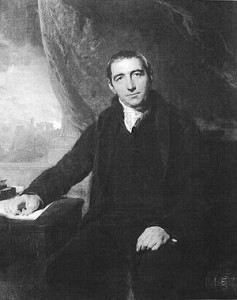 Thomas Taylor (1758-1835) was the first to publish, in English, the complete works of Plato and Aristotle, in 1804. His publication was the completion of valuable work begun by the unfortunate Floyer Sydenham. Taylor is regarded by some as having had a valuable insight into the mind of Plato, which made his translations superior to many others. In 2009, a five-volume, first-edition set went on sale for $22,000.
Thomas Taylor (1758-1835) was the first to publish, in English, the complete works of Plato and Aristotle, in 1804. His publication was the completion of valuable work begun by the unfortunate Floyer Sydenham. Taylor is regarded by some as having had a valuable insight into the mind of Plato, which made his translations superior to many others. In 2009, a five-volume, first-edition set went on sale for $22,000.
Although Taylor’s work was generally well received, a subsequent translation by Rev. Henry Davis scathingly referred to Taylor’s work as “uncouth, obscure, unEnglish and often extremely erroneous.” Nevertheless, Madame Blavatsky and other theosophists were very happy with Taylor’s translation.
A reprint [644] of Taylor’s 1810 translation of Timaeus and Critias has been made available by Kessinger Publishing. Unfortunately, it does not include the Stephanus pagination references, which makes navigation a little more difficult. However, an extensive website dealing with the work of Gerald Massey(b) includes Taylor’s translation of Plato’s Critias and Timaeus with pagination.
>In Taylor’s complete edition of Plato’s works from 1804, there is also a preface by him to the dialogue Critias , which is of some interest from an Atlantological point of view. Thorwald C. Franke notes [1255.347], that in it “Taylor shows understanding that Atlantis finds no credence, since the 9,000 years would contradict the commonly accepted age of the world. Nevertheless, Plato’s Atlantis tradition is as good history as that of others ancient historians too, says Taylor, because it would be Plato’sTotally contrary to the ethos of truth to deceive humanity with such a story. Taylor rejects localizations of Atlantis in America and Africa since the island of Atlantis is said to have sunk into the sea. “(a)<
(a) Thomas Taylor – Atlantisforschung.de (atlantisforschung-de.translate.goog)
(b) Introduction to the Works of Massey (archive.org) (see introduction Pt.5)
Ethiopia
Ethiopia as a geographical area had very different meanings depending on the period in which it was used. Frank Joseph stated[102] that until the 1st century BC. Ethiopia referred to the Atlantic coast of North Africa. Zhirov claimed that ‘Ethiopia’ simply meant a land inhabited by dark-skinned people[0458.98].
Pliny the Elder stated that Aethiopia was formerly called Atlantia (p. 116). Proclus, the Greek philosopher, was convinced that 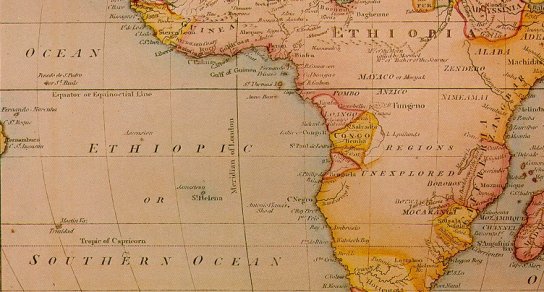 Atlantis existed and was connected with ancient Ethiopia, quoting The Ethiopian History of Marcellus.
Atlantis existed and was connected with ancient Ethiopia, quoting The Ethiopian History of Marcellus.
Col. Alexander Braghine believed[156] in a connection between the ancient Ethiopians and Atlantis. The map above dating from 1650 and published in a book[292] by J.A. Rogers shows the South Atlantic as ‘The Ethiopic Ocean’, while the entire Central Africa is named Ethiopia. We can only conclude that the location of the original Ethiopia is nearly as difficult to pinpoint as the location of Atlantis itself.
In 1936, D. Duvillé suggested[284] that there had been two Atlantises – one in the Atlantic and one in Ethiopia.
It might be worth noting that in Greek mythology, Poseidon was given two Ethiopias, one in the east and the other in the west.
>In 2020, African author George Mac D Lynch published Ethiopia is Atlantis and has made it freely available on the Internet Archive.(a) Lynch has been greatly influenced by the writings of Ignatius Donnelly, Drusilla Dunjee Houston and Gerald Massey. He claims Ethiopia as the cradle of civilisation.<
(a) https://archive.org/details/ethiopia-is-atlantis-george-mac-d-lynch/mode/2up *
Massey, Gerald
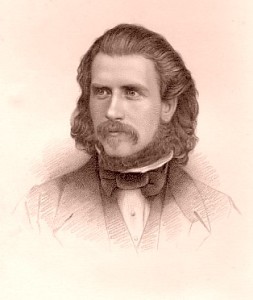 Gerald Massey (1828-1907) was an English poet and self-taught Egyptologist. One result of his studies was to identify the Egyptian god Horus with Jesus. On the subject of Atlantis, Massey claimed that sun-worshipping Atlanteans migrated to Egypt but failed to identify their place of origin. His huge work on ancient Egypt, Ancient Egypt: The Light of the World[1515], is widely available.
Gerald Massey (1828-1907) was an English poet and self-taught Egyptologist. One result of his studies was to identify the Egyptian god Horus with Jesus. On the subject of Atlantis, Massey claimed that sun-worshipping Atlanteans migrated to Egypt but failed to identify their place of origin. His huge work on ancient Egypt, Ancient Egypt: The Light of the World[1515], is widely available.
>His other major work was A Book of the Beginnings [1929] with an introduction by Leslie Shepard.<
There are extensive websites(a)(b) dealing with his work and his sources(c), which include Thomas Taylor’s translation of Plato’s Critias and Timaeus as well as Proclus’ commentary on Timaeus.
(a) See: https://web.archive.org/web/20170618062721/https://www.masseiana.org/intro.htm
(b) See: https://web.archive.org/web/20190327231447/https://gerald-massey.org.uk/massey/index.htm
(c) Introduction to the Works of Massey (archive.org) *
Proclus *
Proclus Lycaeus (412-487) is considered the last major Greek philosopher. 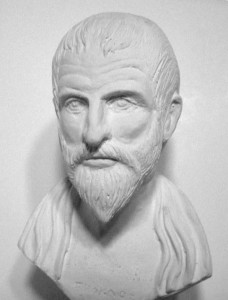 He came from a rich family in Constantinople. After studying in Alexandria and a brief legal career in Constantinople, he went to Athens to study at the famous School of Philosophy founded 800 years earlier by Plato.
He came from a rich family in Constantinople. After studying in Alexandria and a brief legal career in Constantinople, he went to Athens to study at the famous School of Philosophy founded 800 years earlier by Plato.
He refers to ancient historians mentioning seven small islands in the Outer Ocean (Atlantic) dedicated to Persephone and three larger ones, of which one was 1,000 stadia long and dedicated to Poseidon.
It was Proclus who recorded(d) that Crantor travelled to Sais, as part of his research for Plato’s biography and like Solon was shown the pillars on which the Atlantis story was recorded.
In 1820, Thomas Taylor produced the only English translation that we have of Proclus’ commentary. Andrew Collins has drawn attention[0072.100] to a translation error by Taylor, noted by Alan Cameron(e) and Peter James, which seems to offer a quote from Plato rather than Crantor, which in turn obscures whether it was Crantor or Plato actually travelled to Egypt.
A website(a) dealing with the works of Gerald Massey includes Thomas Taylor’s translation of Proclus’ commentary on Plato’s Timaeus(b).
Taylor notes that in a fragment from a lost book of Proclus, he seems to refer to orichalcum under the name of migma(c).
(a) https://web.archive.org/web/20170618062721/https://www.masseiana.org/intro.htm
(b) https://archive.org/details/proclusontimaeus01procuoft (vol..1) *
https://archive.org/details/proclusontimaeus02procuoft (Vol..2) *
(c) https://www.sacred-texts.com/cla/flwp/flwp26.htm
(d) In Platonis Theologiam
(e) https://www.academia.edu/25684803/Crantor_and_Posidonius_on_Atlantis?email_work_card=title
